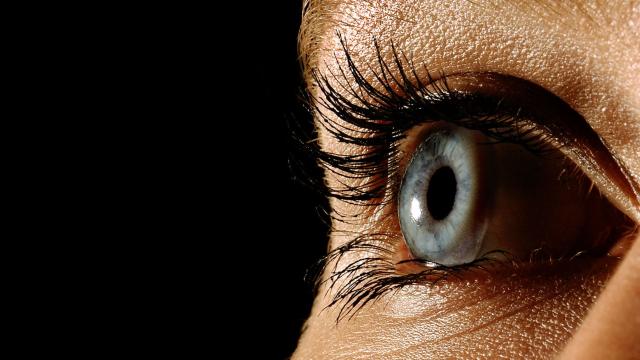Earlier this year, smack in the middle of a typical Monday afternoon, my vision started to blur and cloud like someone had thrown an exposure slider for my eyes all the way to the right. I tried to blink my way through it, but it was no use. So I shut my laptop, briefly panicked and then walked away and slept for an hour.
Photo: Getty
When I woke up, my eyes seemed fine, like nothing had ever happened.
Eye health is something I’ve variously ignored and obsessed over. And it’s something I’ve assumed lots of people think about these days, as our time spent staring at laptops, phones, tablets, and TV adds up. But rarely have I ever asked around to hear if anyone else’s experiences are like mine. Hell, I never did see a doctor.
But it seems my symptoms are entirely ordinary, according to the doctor I called for this story — Dr. Joshua Dunaief, Professor of Ophthalmology at the University of Pennsylvania in Philadelphia.
While Dunaief did not examine my eyes or offer an official diagnosis, he said, “It sounds like something that’s very common. When we stare at something like a computer screen we don’t blink as much as we normally would. Our blink reflex is suppressed and that’s a problem because blinking is important for continued lubrication on the surface of your eye. If you allow the surface of the eye to dry out, things become blurry and your eyes become uncomfortable.”
Over the years, I’ve gathered a handful of lifehacky tricks to avoid this scenario. Essentially, I’ve done everything except what I figure a rational human would do in my shoes: freaking get up and go outside.
I’ve committed, uncommitted, and recommitted to apps like Flux, to adjust the colour temperature of my screen; Time Out, for reminders to look away every so often (every 20 minutes for 20 seconds at a time); WriteRoom or the dark theme in Bear, so I can type white text onto a blank, black screen; and most recently HazeOver, which dims other windows I’m not actively working in.
I’ve also deleted apps that I found suck up a lot of my time, but don’t seem to give much back in return. But for some reason I gave up on most of these tricks in the last year. And now here I am, worrying about overworking my eyes and losing my vision. I find the prospect of going blind absolutely terrifying.
To my surprise, however, Dunaief says the random tips I’ve picked up over the internet can actually help prevent eye strain. Like me, the doctor uses Flux: “I find it to be more comfortable to read the screen when I set it to the redder and greener and no so much blue.” He added, “There is some evidence that long-term exposure to blue light may increase the risk of eye diseases that affect the elderly.”
On typing white text onto a black screen, Dunaief endorsed the idea. “It’s easier to read the text when it’s light text on a dark screen. And the intensity of the light that’s necessary when you read that way is lower,” he said. This is why there’s an option to invert the colours on devices like your iPhone. “Reversing the contrast is a good practice. It’s something that’s used for people who have visual impairment because it’s easier to read.”
But even with all these lifehacks under my belt, I’m still gawking at a screen for hours on end most days. Am I destroying my eyesight? Unfortunately there’s not a lot of research out there to prove or disprove my fears. “There’s very little information about long-term effects because lets face it, people haven’t really been staring at screens all day for that many years. All we can do is extrapolate to other scenarios that might be similar,” said Dunaief.
Dunaief pointed me to the Chesapeake Bay Watermen Study, where researchers studied macular degeneration in people who had been exposed to lots of light while they were out fishing. “The light reflects off the water so it was particularly bright, and the people who had the longest exposure to blue light had the highest risk of macular degeneration,” he said.
Folks wanting app solutions to life problems may find this infuriating, but the solution to overtasked eyes probably involves something called moderation.
When I asked Dunaief if my lifehacky solutions paled in comparison to actually cutting myself off from my laptop, he didn’t seem to want to write them off. “Using flux, using red and green light, decreasing the brightness of the light and inverting the contrast — I think these are things that all help,” said Dunaief. Of course, the best fix for common screen-related eye issues is just as obvious as it is unthinkable for folks obsessed with their devices: Take regular breaks.
“The most important thing is to get up to look out in the distance and stretch, but these other things, I think are also helpful,” he said.
